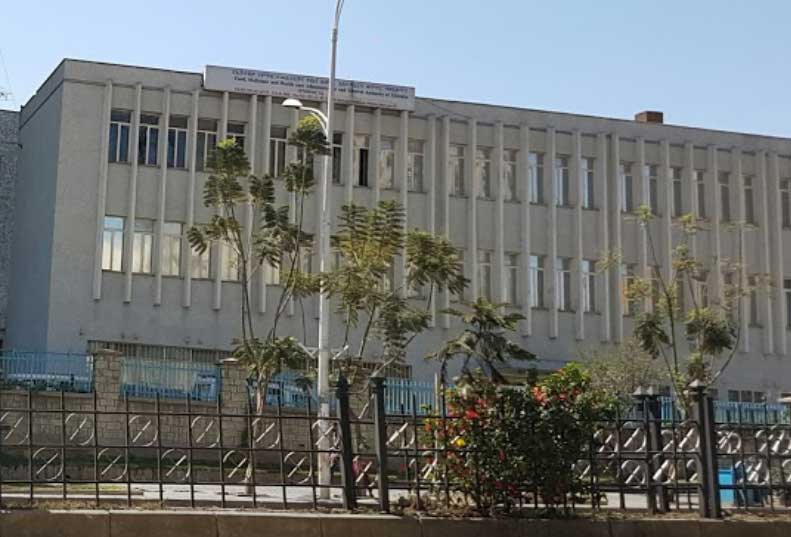
Fortune News | Sep 21,2019
Feb 24 , 2024
By AKSAH ITALO ( FORTUNE STAFF WRITER )
A concerning picture of public health safety was painted by the Ethiopian Food & Drug Authority (EFDA) amid administrative and economic adversities. A surge in illicit pharmaceuticals and contaminated food was revealed during a half-year report with officials seizing a staggering 114tns of outdated, uncertified, adulterated and unlabelled food items, valued at over 66.5 million Br. This led to the closure of 98 companies, underlining the severity of the issue.
Negash Sime, the head of the Food Inspection Department at the Authority, reveals that contaminated food is flooding the markets, making it challenging to trace and monitor sources. He said adulteration, including the use of crude oil as an edible commodity, poses a significant hurdle and efforts to regulate this, including adjustments for oil refiners to meet fortified standards, have encountered significant obstacles.
Although the Authority stipulated mandatory infusion of Vitamin A and Vitamin D, essential for night vision and bone strength, manufacturers are struggling with finances to comply.
"We can't just close them down," he said.
An assessment of 200 retail shops over six months reveals widespread contamination of food, particularly in products like butter and untraceable items such as salt and palm oil, according to the report. The issue is compounded by factories operating without the required certification (COC) from the Authority, creating a significant tracing gap.
Heran Gerba, director of the Authority, notes that the current legal mechanisms lack the necessary strength to combat illicit activities related to contaminated food. A rising trend in cases occurred as a result, with over 118 cases pending for effective legal measures. She attributes this to a misalignment with the Ministry of Trade & Regional Integration, where licensing and renewing occur without certification.
Ministry officials concur. Teketel Geto, team leader of the Food Safety & Quality Control, acknowledges the issue, admitting that licenses have been issued and renewed without the necessary vigilance.
"There is a gap in that regard," he said.
The situation calls for ensuring transparency and accountability. Hiwot Tadesse, former food inspection director at the Autority, highlights mandate overlap among federal agencies and a lack of synergy as major impediments to effective enforcement. Collaboration between the Authority and the Ministry is deemed critical, according to Hiwot, who emphasised the necessity for both institutions to align their vision for effective regulation.
"It all comes down to these two institutions seeing eye to eye," she said.
Adequate market authorisation and registration aided by technology, such as barcoding alternatives is important to develop the capacity of manufacturers and maintain well-trained experts, according to Hiwot. She critiques the legal proceedings against flawed factories, noting that they are often far from enough.
"Meaningful action is taken only when there is a loss of life," she said.
The Authority tasked with ensuring the safety of food and medicines, faces overlapping mandates and broken supply chains. Over 107 million Br worth of medicines were disposed of for being unauthorised, outdated, substandard, and illegally imported or stocked products. The report reveals that only five pharmaceutical manufacturers are certified for Good Manufacturing Practices (GMP), emphasising the need for urgent reforms.
Daniel Waktola, the president of the Ethiopian Pharmaceuticals Suppliers & Manufacturers Sectoral Association, acknowledges the industry's efforts to align with international standards. However, compliance comes with a significant financial burden.
"It's a difficult task to pull off," he told Fortune.
Despite half of the medicines procured by the Ethiopian Pharmaceuticals Supply Service (EPSS) falling under the priority list, challenges persist due to importers failing to meet registration requirements.
As the largest pharmaceutical buyer in Ethiopia, EPSS distributed over 1,000 types of drugs and medical equipment to more than 5,000 public health institutions last year. Yet, weak follow-up and delays in reporting remain persistent issues, hampering the Authority's ability to ensure compliance. Over the past six months, the Authority has only received 1,600 pharmacovigilance reports out of the planned 11,000, covering 28.9pc of the Adverse Drug Experience reports. Although eight pharmacovigilance centres are in university hospitals, Heran notes that most lack awareness of reporting procedures.
"We need to work closely with the institutions," she said.
EPSS carried a substantial 17 billion Br import bill last year, representing a staggering 90pc of the imported drugs in the country. Tariku Belachew, deputy head, underscores the pressing need to enhance their integrated monitoring system to cope with growing demands. This imperative is rooted in the necessity to monitor the adverse effects of drugs once they reach consumers. Tariku also highlights a significant challenge in waste disposal in Adama, Awassa, Jimma and Desse towns, which are operating below capacity.
Blood product supplies also face critical gaps, with the National Blood Bank Service importing reagents crucial for testing 400,000 volumes of blood annually, as it is only sufficient for 21 days.
Ashenafi Tazebew, director of the National Blood Bank Service, brings delays in import permits and clearance procedures mandated by the Authority, to light. He urgently calls for reconsidering changes in the clearance system for a timely and uninterrupted supply of essential medical resources.
The response was grim. A shortage of human resources complicates matters, with the Authority operating with only 35pc of required human capital. It amounts to 1,785 personnel in the city and worsens in other regional parts of the country as making new hires is not viable under the current economic circumstances.
Regulatory hurdles persist, not in the formulation of laws but in their implementation and enforceability. According to Yilma Megistu, deputy head of the Ethiopian Standards Institute, the difficulty in tracing products, especially in cases where distribution lines are unclear. He questions the effective implementation of technology-based regulations, such as barcoding, for the identification of food products and pharmaceutical supplies.
"Why has it been difficult to work on the systemic integration?" he inquired.
The urgent need for regulatory reforms, systemic integration, and effective collaboration between government agencies becomes apparent. A delicate balance between safeguarding public health and supporting the economic viability of manufacturers is at play.
Heran said a new strategy is in the works, including a potential extension of the prohibition of advertisements on social media platforms, particularly targeting alcohol promotions. However, ongoing discussions between the Authority and brewery companies have led to delays in implementing the law.
"We've to be trusted to do our job," she said, during the panel at the Inter-luxury Hotel, on Tito St.
PUBLISHED ON
Feb 24,2024 [ VOL
24 , NO
1243]

Fortune News | Sep 21,2019

Fortune News | Mar 23,2019

Fortune News | Sep 14,2020

Fortune News | Dec 07,2019

Sunday with Eden | Jan 09,2021

Fortune News | Oct 05,2019

Fortune News | Aug 11,2024

Radar | Aug 17,2025

Fortune News | Aug 30,2025

Fortune News | Oct 30,2022

Dec 22 , 2024 . By TIZITA SHEWAFERAW
Charged with transforming colossal state-owned enterprises into modern and competitiv...

Aug 18 , 2024 . By AKSAH ITALO
Although predictable Yonas Zerihun's job in the ride-hailing service is not immune to...

Jul 28 , 2024 . By TIZITA SHEWAFERAW
Unhabitual, perhaps too many, Samuel Gebreyohannes, 38, used to occasionally enjoy a couple of beers at breakfast. However, he recently swit...

Jul 13 , 2024 . By AKSAH ITALO
Investors who rely on tractors, trucks, and field vehicles for commuting, transporting commodities, and f...

Nov 1 , 2025
The National Bank of Ethiopia (NBE) issued a statement two weeks ago that appeared to...

Oct 25 , 2025
The regulatory machinery is on overdrive. In only two years, no fewer than 35 new pro...

Oct 18 , 2025
The political establishment, notably the ruling party and its top brass, has become p...

Oct 11 , 2025
Ladislas Farago, a roving Associated Press (AP) correspondent, arrived in Ethiopia in...